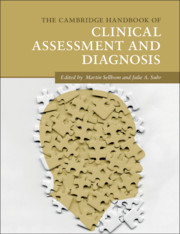Book contents
- The Cambridge Handbook of Clinical Assessment and Diagnosis
- The Cambridge Handbook of Clinical Assessment and Diagnosis
- Copyright page
- Contents
- Figures
- Tables
- Contributors
- Acknowledgments
- 1 Introduction to the Handbook of Clinical Assessment and Diagnosis
- Part I General Issues in Clinical Assessment and Diagnosis
- 2 Psychometrics and Psychological Assessment
- 3 Multicultural Issues in Clinical Psychological Assessment
- 4 Ethical and Professional Issues in Assessment
- 5 Contemporary Psychopathology Diagnosis
- 6 Assessment of Noncredible Reporting and Responding
- 7 Technological Advances in Clinical Assessment
- 8 Psychological Assessment as Treatment
- 9 Writing a Psychological Report Using Evidence-Based Psychological Assessment Methods
- Part II Specific Clinical Assessment Methods
- Part III Assessment and Diagnosis of Specific Mental Disorders
- Part IV Clinical Assessment in Specific Settings
- Index
- References
8 - Psychological Assessment as Treatment
Collaborative/Therapeutic Assessment
from Part I - General Issues in Clinical Assessment and Diagnosis
Published online by Cambridge University Press: 06 December 2019
- The Cambridge Handbook of Clinical Assessment and Diagnosis
- The Cambridge Handbook of Clinical Assessment and Diagnosis
- Copyright page
- Contents
- Figures
- Tables
- Contributors
- Acknowledgments
- 1 Introduction to the Handbook of Clinical Assessment and Diagnosis
- Part I General Issues in Clinical Assessment and Diagnosis
- 2 Psychometrics and Psychological Assessment
- 3 Multicultural Issues in Clinical Psychological Assessment
- 4 Ethical and Professional Issues in Assessment
- 5 Contemporary Psychopathology Diagnosis
- 6 Assessment of Noncredible Reporting and Responding
- 7 Technological Advances in Clinical Assessment
- 8 Psychological Assessment as Treatment
- 9 Writing a Psychological Report Using Evidence-Based Psychological Assessment Methods
- Part II Specific Clinical Assessment Methods
- Part III Assessment and Diagnosis of Specific Mental Disorders
- Part IV Clinical Assessment in Specific Settings
- Index
- References
Summary
Collaborative/therapeutic assessment (C/TA) adds value to psychological assessment by enhancing the therapeutic effects assessment can have. This chapter tracks the influences and research that have guided the evolution of assessment into C/TA and therapeutic assessment (TA), which is a semi-structured C/TA designed to maximize therapeutic effects. It describes the steps and techniques of TA, including developing the client’s questions for an assessment to address, extended inquiry, assessment intervention sessions, and summary discussion sessions. It then explores the empirical foundation that supports the efficacy of C/TA and TA. The added value that TA offers is outlined, including its contribution to working with clients struggling with personality disorders and issues involving epistemic hypervigilance. Finally, discussion of future research that could further TA as an effective consultation technique and as a stand-alone therapeutic intervention itself is considered.
Keywords
- Type
- Chapter
- Information
- The Cambridge Handbook of Clinical Assessment and Diagnosis , pp. 90 - 100Publisher: Cambridge University PressPrint publication year: 2019
References
- 1
- Cited by

